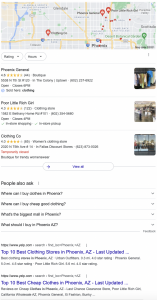The world is searching for new business opportunities — literally. According to The Kauffman Foundation’s Trends in Entrepreneurship Series, Google searches related to new business opportunities saw a significant uptick in March 2020. Amid the pandemic and safety/shelter in place measures, trending terms on Google included “open a business,” “new self-employed,” and “new small business.”
An economic downturn might just be the best time to start a small business. Entrepreneurship, after all, means being ready and willing to take a risk and pursue your passions. However, before you can make the leap forward you need to be able to answer certain questions that will guide you through the early days of running a startup.
1. Is my business idea viable?
Prior to determining if your business idea is viable, you must understand your “why” for starting a small business. This answer varies depending on the entrepreneur and their respective business. Typically, however, the why ties in with a desire to make a difference in customer lives and/or pursue an industry or field you’re passionate about.
Now, you need to figure out if your business idea is viable. How do you do that? You may answer this question by asking yourself relevant questions about the business. Some of these questions may include better understanding what makes your business unique and if there’s a proven demand for your offerings. Additional feedback may be found in your community of support, including friends and family, and directly with customers by conducting surveys and polls.
2. Do I have a unique selling proposition (USP)?
You have a great idea and an interested audience of potential customers. Now, you need to answer the question: what makes your business unique? A unique selling proposition (USP) will allow you to determine what your business can do that others — even those in the same industry — cannot do. Figure out your USP by focusing on the key strengths of your business and its ability to solve problems.
3. Should I draft a business plan?
The answer to this question, especially now that you’ve landed your why, viability, and USP, is yes!
A business plan is one of the biggest assets for a small business. This document allows you to evaluate the feasibility of the business from an objective and critical place and acts as the foundation for which the business is built upon. Seeking investors to fund your business later on? They will want to review your business plan and discuss your financing request together.
4. Do I have a business model?
How will your business make money? This answer should be clearly defined in your business model.
The model itself will vary, depending on the kind of business you’re starting, but it will be defined by four specific factors. These include pricing, marketing and sales, production and delivery methods, and customer experience and satisfaction.
5. Am I ready to incorporate my business?
You do not necessarily need a corporate business structure to start a small business. Many small businesses start off as sole proprietorships due to the affordable nature and ease in filing paperwork.
However, it is advised that entrepreneurs incorporate or form a legal entity, like a limited liability company (LLC), for their startups. Incorporating a business provides it with liability protection. The business is now a separate entity from its owner. If an unforeseen circumstance should occur that negatively impacts the business, the owner does not risk losing their home or car due to the added layer of liability protection.
What else can you gain from incorporating a business? Depending on your entity formation, you may also save money on taxes. You’ll also be able to establish credibility quickly with customers, allowing your business to be viewed through a legitimate lens.
6. How will I fund my startup?
Small businesses require a certain amount of money (often not small) in order to successfully get up and running. Funding a startup may be done through a series of different ways which may include, but are not limited to, the following options.
- Personal savings. You may use personal savings and credit cards to fund your startup. If you have accumulated Rollovers for Business Start-Ups (ROBS), you may also put this 401(k) business financing towards your small business.
- Small business loans. These may be taken out through your bank or at a credit union.
- Grants. These grants may be sponsored by the government or private grants available to small businesses that need a boost in funding.
- Crowdfunding. Entrepreneurs can raise money quickly within their communities through platforms like Kickstarter and GoFundMe.
- Venture capital and/or angel investment. As mentioned earlier, your business plan is where you’ll create and keep a financing request. Depending on the kind of startup you’re running and the amount of capital the business requires, you may attract the attention of a venture capital firm or angel investor for additional financing.
7. What does “success” mean for my business?
Real talk: how will you know your business has been a “success?” Will it be a certain amount of revenue brought in each year? What about receiving prestigious news in the press or serving over a million customers?
Every entrepreneur will determine the answer to this question a bit differently because the road to success varies for every startup. Set early goals and milestones you wish to reach in your business plan, and you’ll be well on your way there!
Business & Finance Articles on Business 2 Community
(55)
Report Post






